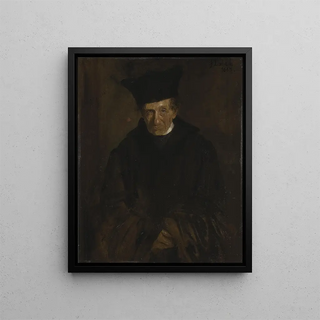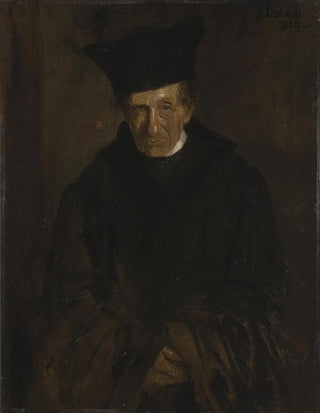Art print | The Theologian Ignaz von Döllinger - Franz von Lenbach


View from behind

Frame (optional)
In the vast panorama of art history, certain works stand out for their ability to capture the essence of an era, a personality, or a movement. The art print of Ignaz von Döllinger - Franz von Lenbach is a perfect example. This portrait, created by the German painter Franz von Lenbach, does not merely depict a man; it tells the story of an intellectual whose ideas shaped the theological landscape of the 19th century. The piece immerses us in the universe of Ignaz von Döllinger, a theologian whose reflections on faith and reason have resonated through the ages, inviting the viewer to a deep and thoughtful contemplation.
Style and uniqueness of the work
Lenbach's style is characterized by an exceptional mastery of portraiture, combining realism with psychological depth. In this work, the theologian appears with a presence that transcends mere physical representation. The colors, carefully chosen, evoke an atmosphere of gravity and serenity. The treatment of shadows and lights reveals not only Döllinger's facial features but also the complexity of his thought. Each brushstroke seems to breathe inner life into its subject, making palpable the intellectual intensity that animated him. The composition, balanced and harmonious, draws the eye toward the theologian's eyes, which seem to scrutinize the world with wisdom tinged with questioning. This portrait is not limited to a simple representation; it becomes a true mirror of the soul, a space where the viewer can question their own faith and convictions.
The artist and his influence
Franz von Lenbach, an emblematic figure of German painting, established himself as a renowned portraitist in the 19th century. His ability to capture the essence of his subjects allowed him to work with many influential personalities of his time, from artists to politicians. Lenbach does not merely reproduce external appearances; he strives to reveal the depth of the human spirit. His work on Döllinger fits within this tradition, demonstrating his commitment to representing significant figures in history.

Matte finish

View from behind

Frame (optional)
In the vast panorama of art history, certain works stand out for their ability to capture the essence of an era, a personality, or a movement. The art print of Ignaz von Döllinger - Franz von Lenbach is a perfect example. This portrait, created by the German painter Franz von Lenbach, does not merely depict a man; it tells the story of an intellectual whose ideas shaped the theological landscape of the 19th century. The piece immerses us in the universe of Ignaz von Döllinger, a theologian whose reflections on faith and reason have resonated through the ages, inviting the viewer to a deep and thoughtful contemplation.
Style and uniqueness of the work
Lenbach's style is characterized by an exceptional mastery of portraiture, combining realism with psychological depth. In this work, the theologian appears with a presence that transcends mere physical representation. The colors, carefully chosen, evoke an atmosphere of gravity and serenity. The treatment of shadows and lights reveals not only Döllinger's facial features but also the complexity of his thought. Each brushstroke seems to breathe inner life into its subject, making palpable the intellectual intensity that animated him. The composition, balanced and harmonious, draws the eye toward the theologian's eyes, which seem to scrutinize the world with wisdom tinged with questioning. This portrait is not limited to a simple representation; it becomes a true mirror of the soul, a space where the viewer can question their own faith and convictions.
The artist and his influence
Franz von Lenbach, an emblematic figure of German painting, established himself as a renowned portraitist in the 19th century. His ability to capture the essence of his subjects allowed him to work with many influential personalities of his time, from artists to politicians. Lenbach does not merely reproduce external appearances; he strives to reveal the depth of the human spirit. His work on Döllinger fits within this tradition, demonstrating his commitment to representing significant figures in history.






